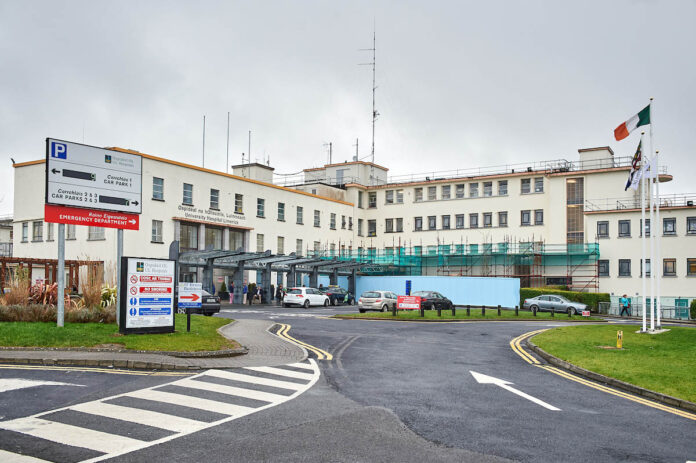THE increasing pressure on the Emergency Department at the University Hospital Limerick (UHL) has resulted in longer triage times for patients, which poses a “clinical risk”, a new report has warned.
The Deloitte Report on patient flow and overcrowding at UHL expressed concern about the 7% increase in ED attendances between 2019 and 2022, a growth rate far in excess of demographic growth.
This demand demonstrates an increasing reliance on acute hospital care and is associated with an increase in self-referrals to the ED as capacity constraints in primary care and particularly within general practice continue.
Acknowledging the chronic lack of adequate bed capacity in the region, this new study recommends an additional 302 inpatient beds required by 2036 to meet current unmet demand, future demand and to replace outdated infrastructure in multi-occupancy nightingale wards.
It proposed the provision of additional 63 day beds by 2036, and stressed additional medical consultant, non-consultant hospital doctors and nursing staff in the Emergency Department are an “immediate priority”.
Additional medical staff are needed to extend the operating hours of the Acute Medical Unit at UHL, while significant deficits in health and social care professionals on wards across the group to facilitate admissions avoidance, earlier discharges and development of integrated care pathways need to be addressed.
The eHealth systems across the hospital and community need to be upgraded to a fit-for-purpose single electronic healthcare record.
Between 2019 and 2021, there was an increase of 7% in ED attendances at UHL and an increase of 11% in inpatient discharges and 15% in bed nights across the UL Hospitals Group.
An analysis of hospital group catchments across the country shows ULHG to have the fewest in-patient beds per 1,000 population (2.02) as well as the lowest consultant, NCHD, nursing and HSCP staffing levels per capita.
Another factor unique to the Mid-West is that the region has the lowest private hospital bed capacity.
Outdated multi-occupancy inpatient wards, accounting for 199 of the current 530 inpatient beds at UHL, causing significant additional challenges on infection control and patient flow.
The report also highlights the demographic and socio-economic factors in the Mid-West, which are driving increased demand on hospital services, including a higher proportion of older and disabled patients in the population; a higher frailty index and a higher social deprivation index.
The lack of in-patient bed capacity compared with demand is evident from the ED attendances to in-patient bed ratio which is higher in UHL than in all other Model 4’s excluding the Mater where
there is a similar ratio.
Comparing UHL with Galway University Hospital, demonstrates that GUH has 88 beds more; that equates to an additional 32,120 in-patient bed days, despite having 7,586 fewer attendances than UHL in 2021.
“UHL in-patient bed capacity cannot meet the current demand for elective and emergency care for the population of the Mid-West region which has resulted in high in-patient bed occupancy often
with trolleys on wards and surge capacity in operation whereby day wards are used to manage in-patients and elective services are cancelled,” the report stated.
“The cancellations of elective care further exacerbates the issue with no alternative pathways for patients and increasing numbers attending the ED. Overcrowding in the hospital is impacting the experience for both staff and patients.”
“Many of the stakeholders interviewed were proud of the care delivered in UHL. However, there is fatigue among staff due to consistent pressures on the system which is impacting their pride and positivity in the organisation.
“Similarly, while there were many examples of collaboration and teamwork there were also areas where this could be improved.”
The report stated discharges tend to happen late in the afternoon, with 35% of discharges happening between 2pm and 4pm and 29% happening between 4pm and 7pm.
This means that by the time beds are turned around it is past the peak ED attendance period, which is from 10am to 4pm, resulting in increased patients awaiting beds during the day. Discharges are also much lower at the weekends.
The requirement to implement Covid-19 streaming pathways for patients in the ED has resulted in significant changes to the acute care pathways.
The introduction of Covid-19 streaming in the ED in UHL resulted in patients with ‘Covid-19 like symptoms’ being streamed for assessment to two Zones within the ED (Zones B&C) and patients without these symptoms streamed to Zone A.
Zone A had previously been used for the assessment of ambulatory patients meaning that there was a high throughput of patients through this area.
Another significant change that was implemented with this Covid-19 streaming was the direct referral of patients from triage to the AMU and ASAU without prior assessment by an ED doctor and the removal of access for GP referrals to these units.
The report found the implementation of this streaming has resulted in a reduction in the rate of discharge home from the ED and an increase in referrals to the AMU and ASAU directly following
triage.
This is resulting in undifferentiated patients being assessed by medical and surgical registrars, with a high admission rate from the AMU in particular which increases the overall admission rate and demand for inpatient beds.
Noeleen Moran from the Mid-West Hospitals’ Campaign expressed disappointment the consultants didn’t engage with staff below management level, trade unions or patients.
If Ennis Hospital was upgraded to a Model Three Hospital, she said it could do elective procedures and have a functioning Emergency Department.
She said, “It is time for Health Minister Stephen Donnelly to take a serious examination of the situation.
“We need Ennis upgraded and we need our emergency department reopened.”
East Clare correspondent, Dan Danaher is a journalism graduate of Rathmines and UL. He has won numerous awards for special investigations on health, justice, environment, and reports on news, agriculture, disability, mental health and community.




